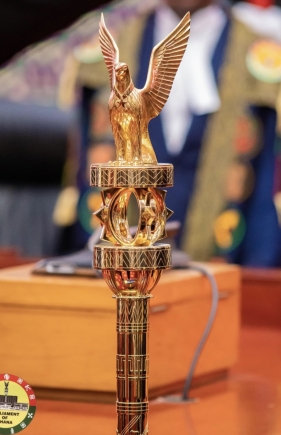The Speaker of Parliament, Alban Sumana Kingsford Bagbin, has directed all members, ministers and deputy ministers currently holding any office of profit or emolument not expressly authorised by law or not under any exception to take steps to regularise their positions without delay.
He said no member, minister or deputy minister shall accept or retain any office of profit or emolument without first obtaining the required permission of the Speaker.
He warned that any breach of his directive would constitute a serious violation of the Constitution, saying that “silence, oversight or informality shall not be accepted as a substitute for compliance”.
“Any such member shall, within 14 days from the date of communication, submit to the Committee on Office of Profit a formal request for approval in accordance with the procedure set out under Standing Order 244,” he directed.
In a statement on the compliance by members, ministers and deputies constitutional and procedural requirements relating to offices of profit, Mr Bagbin said the request shall disclose the nature of the appointment, the duties involved, any remuneration attached and any other matter necessary for a full assessment by the Committee on Office of Profit.
Directing the Committee on Office of Profit to treat the matter with urgency, he said “The Committee shall receive and review all requests for ratification promptly, and submit its recommendations to me for determination.
“In the course of its work, the committee is reminded to apply the constitutional test strictly and consistently, ensuring that no recommendation is made unless the conditions under Articles 78(3) and 98(2) are fully satisfied,” he said.
Avoiding conflict of interest
The Speaker said articles 78(3) and 98(2), together with the Standing Orders, were designed to preserve the constitutional balance between the Legislature and the Executive, avoid undue influence, and maintain the trust reposed in members by the electorate.
“These provisions ensure that ministers and members do not convert public service into a platform for personal wealth accumulation, nor use their positions to gain undue advantage in the private sector or state institutions,” he said.
In his view, the work of a minister or member of Parliament was demanding and time-consuming.
“Holding additional appointments, especially those with financial or executive obligations raises legitimate concerns about whether such individuals can adequately perform their primary duties.
“Where these appointments are accepted without scrutiny or oversight, there is the additional risk that state boards, corporate entities, or regulatory agencies become politicised, and accountability mechanisms are compromised or weakened or both,” he explained.
Entrenching practice
To give effect to these provisions, Order 224 of the Standing Orders of Parliament establishes the Committee on Office of Profit, chaired by the Second Deputy Speaker to compose of up to fourteen additional members.
The Speaker said the House could afford to compromise on the principles of public trust, accountability and institutional integrity.
“It is the duty of every public officer to ensure that their conduct does not call into question the credibility of the offices they hold. The Speaker calls on all members to lead by example and to adhere strictly to the standards expected of them under the Constitution and the Standing Orders.
He said it had become a practice that members of Parliament, ministers and deputy ministers, accepted appointments to various boards, committees and external positions, many of which carried remuneration or other benefits.
He said they did so without seeking the permission of the Speaker as required by the Constitution and the Standing Orders of Parliament.
Beyond those appointments, there was also a growing pattern of members actively engaging in private business ventures and professional undertakings that raised legitimate concerns about interference with the proper discharge of their public functions, prejudice and potential conflicts of interest.
Mr Bagbin said while some of those appointments might be validly made by operation of law or arise from constitutional designation, a significant number fell outside these narrow exceptions.
“This trend, if left unchecked, risks eroding the ethical standards of public service, weakening parliamentary oversight and compromising the credibility of Parliament in the eyes of the public.
“The time has come to restate, apply and give effect to the rules, affirm the institutional safeguards, and take the necessary steps to restore full compliance with both the letter and spirit of the Constitution,” he said.
Curbing politization of institutions
Saying that the Constitution was clear on the matter, the Speaker cited Article 98 of the Constitution which he said was a constitutional imperative.
The Committee was mandated to advise the Speaker on members, ministers and deputy ministers who sought to be permitted to hold office of profit or emolument, whether private or public and either directly or indirectly on the grounds that satisfies the constitutional conditions as stated under Article 78 (3) of the Constitution.
He explained that the Speaker’s discretion under Articles 78(3) and 98(2) was not personal or arbitrary.
“It is exercised on the basis of recommendations from the Committee and only where the constitutional tests have been met.
“The framework is, therefore, mandatory and structured, not discretionary or optional. No member or minister may self-interpret compliance or act on the assumption that failure to comply with the procedure or silence amounts to approval by the Speaker,” he said.
He pointed out that those provisions formed part of Ghana’s broader constitutional safeguards to preserve the independence of Parliament, protect public confidence in its members and ministers, and prevent undue influence by limiting divided loyalties, conflicts of interest and private inducements.
He added that the framers of the Constitution incorporated similar controls.

